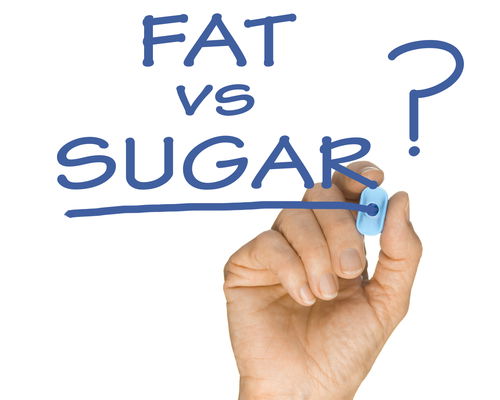Is a Low Carb Menu Healthier than a Low Fat Diet?

In numerous weight loss studies, the group following a low-carb diet lost statistically significant more weight. Some dieters lost about three times more by managing carbohydrate intake than those consuming a low-fat diet. With studies suggesting there is no clear winner between the low-carb or low-fat approach, what researchers have suggested to be important is for dieters to stay focused on a healthy lifestyle and stick with their diet plan. For decades, dieters were told to avoid eating fat to keep from being fat. After all, fat has twice the calories per gram than the same amount of carbohydrates or protein. Nonetheless, consuming both healthy fats and consuming healthy carbs can help you shed pounds. Rather than looking for a diet that offers you a quick fix, you should focus on an effective menu plan with plenty of healthy food choices and as few restrictions as possible.
Common Types of Sugars
Sugar is versatile and cannot be replaced by another single ingredient. Listed below are the four basic forms of sugars found in carbohydrates:
- Monosaccharides - Composed of carbon, hydrogen and oxygen atoms, monosaccharides cannot be broken down further since they are already in their simplest form. Glucose (dextrose), fructose and galactose are common monosaccharides.
- Disaccharides - When two simple sugars are joined, a double sugar or disaccharide is formed, like table sugar (sucrose) or lactose. Sucrose is the most consumed disaccharide. Like monosaccharides, disaccharides are water soluble.
- Polysaccharides - Polysaccharides molecules consist of several sugar molecules bonded together, such as a starch or cellulose. These polymeric carbohydrate structures serve as energy storage or structural support as they are not highly digestible but provide dietary fiber.
- Oligosaccharides - This saccharide polymer contain a small number of simple sugars (monosaccharides) and have many functions such as cell recognition and binding. They have an important role in supporting the immune system.
From breakfast pastries to soft drinks, thousands of food and drink products contain added sugars, which has led to our ever-increasing cravings for sweets.
How Does the Body Process Fats?
Practicing moderation, portion control, and selection of carbohydrates and fat is essential for health and well-being. Despite the obsession with diets and fitness regimes, many “so-called” specialists cannot correctly answer the question as to where body fat goes when pounds are shed. The most common misconception about fat loss, is that the fat is converted to energy and burned as fuel. Although fat converts to carbon dioxide and water, hyperventilating cannot boost weight loss. Unfortunately, simply making your lungs huff and puff will only make you dizzy. Carbon dioxide is only produced when you are moving muscles. It is important to consult with a weight loss specialist prior to starting your fat loss journey to prevent or limit the potential negative side effects commonly seen in failed diets.
By submitting this form, you agree to receive marketing text messages from us at the number provided, including messages sent by autodialer. Consent is not a condition of any purchase. Message and data rates may apply. Message frequency varies. Reply HELP for help or STOP to cancel. View our Privacy Policy and Terms of Service.

